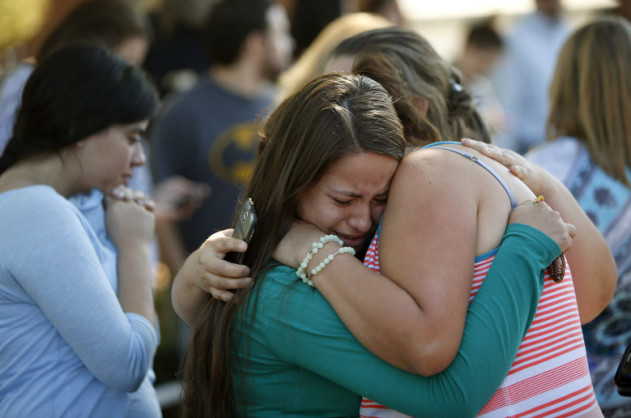It’s time we ask why it is that men and boys are far and away the most common perpetrators of this kind of violence.
“Our thoughts and prayers are not enough.”
That’s what the President of the United States said yesterday in Washington, D.C., when he stepped to the podium to make a statement about the killings of nine people by a lone gunman on a small college campus in a rural Oregon town.
A clearly frustrated Barack Obama charged that mass shootings had become “routine,” occurring with such regularity that he’d already presided over a dozen press conferences related to similar horrors during his tenure.
Head bowed and lips pursed, he wondered aloud what it would take for the “body politic” to react and decisively enact tougher firearms laws.
Allowing that “anybody who does this has a sickness in their mind,” Obama laid at least part of the blame for the carnage at Umpqua Community College squarely on the shoulders of the gun lobby.
“It cannot be this easy for someone who wants to inflict harm on other people to get his or her hands on a gun. This is a political choice that we make to allow this to happen every few months in America,” Obama said, his voice rising. “We collectively are answerable to those families who lose their loved ones because of our inaction.”
Every few months in America came to Roseburg yesterday morning.
As students sat in class on a balmy early fall day, a 26-year-old man walked into a hallway and opened fire. He died in a hail of bullets after engaging with the first responders to the 911 call.
State and national media identified the shooter just after 7pm Pacific Standard Time, but the Douglas County sheriff announced he would “never mention” the name of the person who took so many lives in the space of only a very few minutes.
“Let me be very clear: I will not name the shooter,” Sheriff John Hanlin told reporters. “I will not give him the credit he probably sought prior to this horrific and cowardly act. Media will get the name confirmed in time, but you will never hear me mention his name. We encourage you not to repeat it, not to glorify and create sensationalism for him. He in no way deserves this.”
They were two men with two different messages on separate sides of the country, united by grief and despair over their inability to conjure or command answers to a particular strain of violence inflicted almost exclusively by males.
This weekend and into next week, our focus will be on the agony of the families of the slain and the emotional welfare of this now-bereaved community 180 miles south of Portland. We’ll send flowers and build shrines and post messages on Facebook urging everyone to pray for Roseburg.
But after the vigils, the funerals and inevitable protracted hand-wringing over whether the real enemy is a broken mental health system or the NRA, the national dialogue will stay stuck on “de-gendered talk about psychopaths, shooters, killers, suspects, youths, perpetrators, and troubled teens,” predicts cultural theorist, filmmaker, and anti-violence educator Jackson Katz, who says we’re looking in entirely the wrong direction.
“We never ask tough, basic questions about why it is that men and boys are far and away the most common perpetrators of this kind of violence,” Katz told interviewer Jeremy Earp of the Northampton, Massachusetts-based Media Education Foundation in this recent interview. He asserted that school shootings, 99 percent of which are committed by males, are “almost always revenge killings carried out by boys who have been bullied, socially ostracized, or marginalized.”
While girls and women tend to internalize criticism, disrespect, shaming, and shunning—and therefore rarely, if ever, commit wide-scale atrocities against others—boys and men are far more likely to externalize them.
In extreme cases they lash out as a way to reclaim their perceived lost manhood, Katz says. But he also thinks that in a media-driven society that glamorizes violence as a way to prove masculinity, there’s hope for change—and it starts with altering our most basic ideas about what it means to be a man.
The path to male emotional literacy—the ability of men to process feelings of sadness, doubt, and insecurity—is often obstructed by a culturally-encouraged tendency to “identify those feelings as anger, and [to] then respond to that anger by taking it out on others,” said Katz, who suggests we take a hard look at how our society’s preconceptions about manhood intersect with male-executed violence.
Until we do that, he continued, “we’re just going to keep lurching from one tragedy to the next, with little understanding of what’s really happening or how we can break this destructive pattern.”
In his remarks yesterday afternoon, our president lamented that as a nation we’ve “become numb” to reports of rampages like the one out of Oregon. Predictably, he said, we’ll spend a fair amount of time wondering why it happened again—and we should—but unless we ask the question in new, bolder, and more insightful ways, there can be no altered outcome.
The definition of insanity and all.
What if we took Obama’s, Hanlin’s, and Katz’s entreaties to heart? If we look closely, they shared a common golden thread: reciprocity.
Let’s depoliticize gun control, said Obama, so we can have a more intelligent conversation about it.
Let’s agree not to give the shooter the spotlight, said Hanlin, so fewer murderous people will seek it.
Let’s figure out a better way to value and support our boys, said Katz, so they turn into more confident and fully-functional men.
They’re all right. And yes, thoughts and prayers only go so far.
Nancy Townsley’s work has most recently been published in Brain, Child Magazine, Elephant Journal, NAILED Magazine, The Riveter Magazine, and Bleed, a literary blog from Jaded Ibis Press. She lives in St. Helens, Oregon, and will run her tenth marathon in Portland on October 4.
Related Links:

